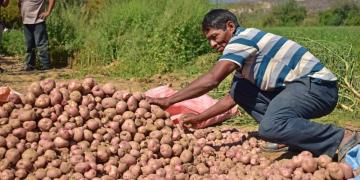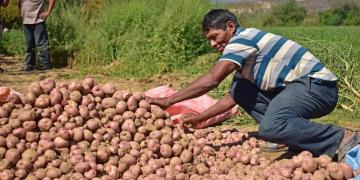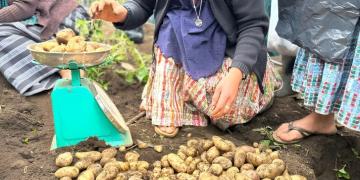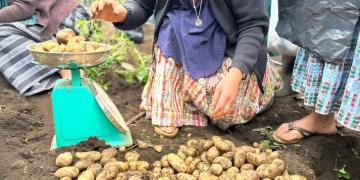Europe: The European potato faces a saturated market and pressure to prioritize quality and contracts.
The 2025 European potato campaign is kicking off in a complex environment, marked by saturated markets, historic low prices, and strong international competitive challenges.

The press release recently published by Belpotato.be clearly reflects the delicate situation facing the sector in Europe, especially in the NEPG region (Germany, Belgium, France, and the Netherlands), where the increase in cultivated area and the global economic situation are affecting the outlook for the new harvest.
It should be noted that Belpotato.be, the trade association for the Belgian potato chain, was born from the union of forces of the General Farmers’ Union (ABS), Belgapom, Boerenbond, Fiwap, and the Walloon Federation of Agriculture (FWA).
A free market with no way out and rock-bottom prices
During this period of early variety deliveries , the free market has virtually no outlet. Potato volumes not covered by contracts fail to find buyers, while industry and commerce cover their needs exclusively with contracted potatoes. This situation leaves producers with only one alternative: turning to secondary channels such as animal feed, biogas, or composting to absorb the surplus production accumulated in 2024.
Free market prices reflect this tension. Early potatoes destined for processing barely reach €15/ton, a figure considered extremely low, placing farmers in a critical position. At this price, many producers are barely able to cover a fraction of their production costs, exacerbating economic uncertainty in the countryside.
Rising acreage and uneven growing conditions
The Belpotato report highlights that the potato acreage in the NEPG zone has increased by 55,000 hectares during 2025. This increase is due to early planting decisions, driven by favorable spring conditions. However, the summer has not been as favorable: drought has slowed growth in certain regions, which could lead to significant yield variations between areas.
Regarding the harvest of storage varieties, forecasts indicate that average yields will exceed last year’s. Despite this, the big question remains how gross production will align with actual market demand once the harvest season is well underway.
Industrial processing: the weakening engine of the sector
Industrial potato processing, the main driver of the sector in Europe, is experiencing a period of contraction. For over a year, demand for frozen products in international markets has been declining. This decline is related to multiple factors:
Rising costs: Post-COVID-19 pandemic inflation has driven up costs for labor, energy, and raw materials.
Appreciation of the euro against the dollar, which reduces the competitiveness of European exports.
Rising cost of raw materials: both in the free market and through contracts, potatoes have made the process more expensive.
International competition: China and India have increased their exports of finished products tenfold in the last five years.
Tariff barriers: Measures imposed by the United States during Donald Trump’s presidency continue to affect European products.
This combination of factors has reduced the competitiveness of the European industry compared to North America and Asia, generating growing concern in the sector about its medium-term sustainability.
Call for quality and contract fulfillment
Given this situation, Belpotato is calling on the entire sector to prioritize quality over performance during the 2025/2026 campaign. The goal is not only to guarantee a product that meets the needs of the industry and consumers, but also to strengthen the stability of contractual relationships.
The organization recommends that producers dry their foliage as soon as the tubers reach the required size and dry matter content criteria. This practice allows them to meet the volumes agreed upon in their contracts, avoid delays, and also reduce risks arising from adverse weather conditions in the fall. The strategy also promotes soil health and enables early planting of follow-up or catch crops.
Commitment to economic sustainability
The sustainability of the sector, Belpotato points out, depends on all participants—producers, marketers, and processors—respecting the agreements reached regarding volume, quality, and delivery times. Strict contract compliance is emerging as a fundamental pillar for overcoming market volatility and avoiding imbalances that harm the entire value chain.
Belpotato: mediator in times of crisis
Over the past five years, Belpotato.be has played a central role in improving inter-professional relations, particularly around contractual practices. During the coronavirus health crisis, it already demonstrated its capacity for coordination and support for the sector. Today, its goal is similar: to support farmers, retailers, and industry in an uncertain environment, fostering market transparency and promoting internal dialogue.
The organization insists it will continue to closely monitor the sector’s developments during this campaign, with the aim of anticipating problems and strengthening cooperation between the various links in the chain.
Conclusion: A decisive year for the European potato
The 2025 crop year is shaping up to be a turning point. With prices plummeting on the free market, supply exceeding demand, and a weakened industrial engine, the sector’s survival will depend on the ability to produce quality, honor contracts, and strengthen cooperation. Belpotato is once again emerging as a benchmark in crisis management, seeking to ensure that the European potato not only withstands current difficulties but also lays a more solid foundation for its future.
Fuente: Traducido por Argenpapa de: agronewscastillayleon.com




